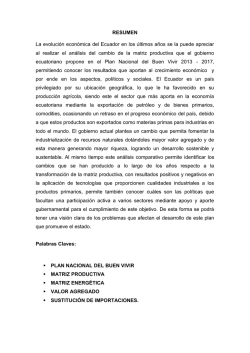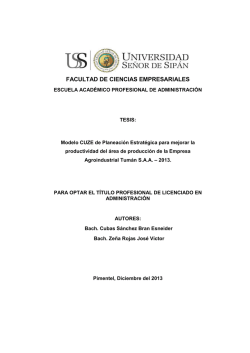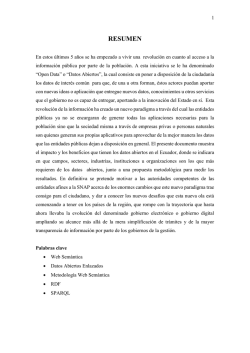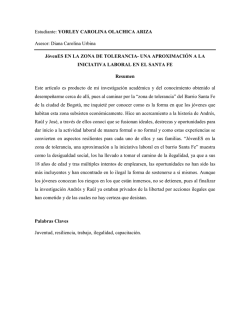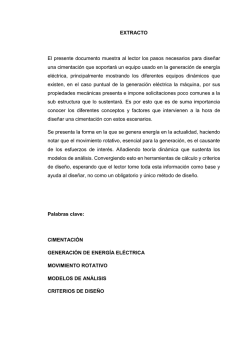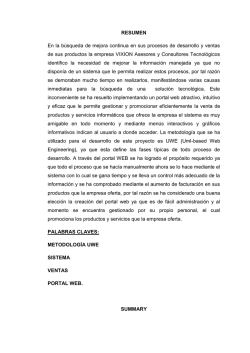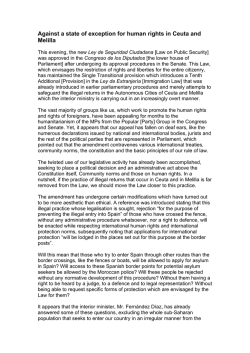
RE_MAESTRIA_DER_JOSE
ESCUELA DE POSTGRADO SECCIÓN DE POSTGRADO DE DERECHO LAS INTERVENCIONES CORPORALES SIN EL CONSENTIMIENTO DEL IMPUTADO EN EL CÓDIGO PROCESAL PENAL DE 2004. UNA VISIÓN CONSTITUCIONAL TESIS PARA OPTAR EL GRADO DE MAESTRO EN DERECHO MENCIÓN EN DERECHO PENAL AUTOR: Bach. JOSÉ ANTONIO HUAYLLA MARIN ASESOR: Dr. Giammpol Taboada Pilco Trujillo, 2015 DEDICATORIA A mis motivos de superación y luz de mis ojos; mi esposa Lourdes e hija Lucianita. i AGRADECIMIENTO A mis hermanas, sobrino y mis padres con especial deferencia porque me impulsaron a ser algo en esta vida. ii RESUMEN La presente tesis aborda la problemática relacionada a la regulación de la institución procesal denominada intervenciones corporales la misma que permite practicarla incluso sin el consentimiento del imputado, aspecto que contradice todo lo relacionado a la obtención de prueba válida. Es por ello que en la presente investigación se han planteado fundamentos doctrinarios, jurisprudenciales y normativos que legitiman la regulación de dicha institución procesal, pues considero que con dicha regulación podremos garantizar el éxito en una investigación, así como proteger y hacer valer los derechos de las víctimas de conductas delictuosas así como brindar mayor seguridad jurídica e indefectiblemente lograr aproximarnos a una verdad real; pues con estas medidas la sociedad también podrá confiar en el sistema de administración de justicia y consecuentemente se reducirían los índices de percepción de impunidad. Asimismo, se ha podido determinar que una cosa son los fundamentos de su regulación y otra cosa son los presupuestos para la procedencia de estas medidas, como son que la medida limitativa se encuentre prevista en la ley, que sea adoptada mediante resolución judicial, salvo peligro en la demora como los casos de conducción de vehículo en estado de ebriedad, y fundamentalmente aplicar el test de proporcionalidad para cada caso concreto, conforme a los lineamientos establecidos por nuestro Tribunal Constitucional y la legislación comparada. Finalmente, en la presente investigación se ha creído conveniente analizar como se vienen amparando en el Perú este tipo de medidas y bajo que fundamentos se autorizan las mismas, por lo que se han analizado sendos requerimientos fiscales y resoluciones judiciales respecto al tema bajo análisis, habiendo obtenido como resultado la existencia de deficiencias en la motivación en la determinación del test de proporcionalidad al caso concreto, pues muchas veces se realiza una simple réplica de los considerandos ya establecidos por nuestro Tribunal Constitucional, es decir, en no todos los casos existe el análisis y su empleo al caso concreto, constituyendo a veces una suerte de plantilla de los conceptos o jurisprudencias paradigmáticas sin hallar el vínculo que las haga aplicables al caso en estudio. iii ABSTRACT This thesis deals with the problems related to the regulation of procedural institution called body interventions, allowing it to practice even without the consent of the accused, something that contradicts everything related to obtaining valid test. That is why in this investigation have been raised doctrinal, jurisprudential and normative foundations that legitimate regulation of the procedural institution, because I believe that with this regulation can ensure success in research, and to protect and enforce the rights of victims of criminal behavior and to provide greater legal certainty and unfailingly approach to achieve real truth, since the measures the company may also rely on the system of administration of justice and consequently the perception of impunity rates would be reduced. It has also been determined that one thing are the foundations of regulation and else are the estimates for the origin of these measures, such as the limited extent be found under the law, to be adopted by judicial decision, except danger in delay as cases of vehicle driving while intoxicated, and essentially apply the proportionality test for each case in accordance with the guidelines established by our Constitutional Court and comparative law. Finally, this research has seen fit to analyze as are sheltering in Peru such measures and under what grounds authorizing them, so they used two separate tax claims and judgments on the subject under analysis, having obtained as a result of the existence of deficiencies of motivation in determining the proportionality test to this case, because often a simple replica recitals already established by our Constitutional Court, ie, in not all cases there is the analysis is performed and their use to the case, sometimes forming a sort of template concepts or paradigmatic case law without finding the link that makes them applicable to the case study. iv
© Copyright 2026
